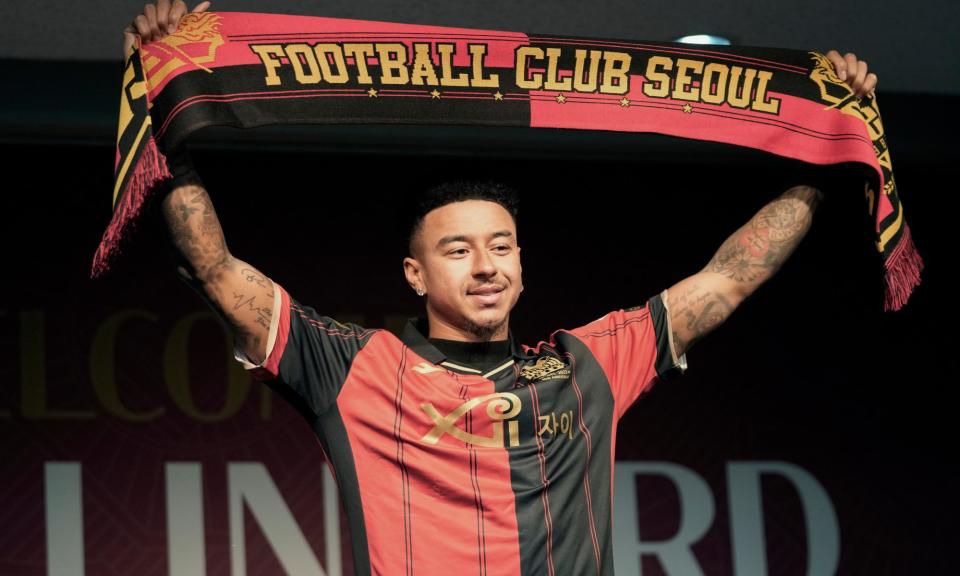Jesse Lingard lands in Korea with club and player in search of former glories

Apart from rumours of the original Ronaldo’s agent offering his client to South Korean clubs towards the end of the Brazilian’s career, the K-League has not had a sniff of the high-profile players who have gone to China and Japan. Now, though, Jesse Lingard has joined FC Seoul to become the biggest name to head to the Land of the Morning Calm. This is no new Asian market muscling its way, Saudi-style, on to the global scene but the transfer is perhaps the most intriguing this year.
The former Manchester United forward was last seen playing for Nottingham Forest in April and arrived this month at Incheon International Airport, where he was handed a traditional wind instrument and an opportunity to breathe new life into a career that has stalled and a club that has been falling. Adding a new tune to Asia’s oldest professional league also wouldn’t go amiss.
Lingard is the biggest fish in a decent-sized pond. Rarely has there been reporting on a foreigner playing Yutnori, a traditional game played with sticks usually around the lunar new year. He has done the obligatory photo at a Korean barbecue, one of the world’s great culinary experiences, and is sure to be asked about kimchi more than once as he settles into life in one of Asia’s most vibrant and exciting cities. On the pitch however he has a job to do and not just to help Seoul recover former glories when the season kicks off at the start of next month.
Download the Guardian app from the iOS App Store on iPhone or the Google Play store on Android by searching for 'The Guardian'.
If you already have the Guardian app, make sure you’re on the most recent version.
In the Guardian app, tap the Menu button at the bottom right, then go to Settings (the gear icon), then Notifications.
Turn on sport notifications.
The K-League is not a glamorous competition but attendances are slowly rising, with the average last season more than 10,000. The quality is good. In continental terms, it is arguably one of the top three along with Japan and Saudi Arabia. The club champions of Asia have come from Korea more often than from any other country. Many foreign players have come and struggled with the physical nature of the 12-team league as well as the pace and technical ability of players in all positions.
Some imports welcome all that but coaching can be a tad on the monotonous side with most managers preferring to counterattack. A player’s professional lifestyle can be relatively strict compared with England, with teams spending more time together, especially in the days before games.
Englishmen have been a rare sight over the years. The best of a small bunch was probably the former Burnley and Stoke striker Andy Cooke and his solid 18-month spell at Busan from 2003 to 2005 alongside Jamie Cureton, under the coach Ian Porterfield. The most recent import was Jordon Mutch but the former Crystal Palace and Cardiff midfielder had his contract terminated by Gyeongnam FC after a few months in 2019.
Some Asian clubs are better at helping foreign players acclimatise than others but all will tell you that although there are foreign players who come and go without making an impact, those who stay and want to make a difference will end up being loved. The Seoul and K-League legend Dejan Damjanovic, who had scored against England for Montenegro in home and away 2014 World Cup qualifiers, is evidence of that. Working as hard as possible on and off the pitch, making an effort to speak a little of the language, getting to know teammates and being interested in the country and culture go a long way to a happy stay.
If Lingard can help widen the appeal of domestic football then all the country’s fans will be pleased. The league has a solid foundation of support but a former United and England player can perhaps help bridge the gap between that K-League hardcore and those who prefer to watch Son Heung-min and others in European action. Lingard is not a household name in Korea but his arrival has been big news – though slightly overshadowed by the fallout from the national team’s failure at the Asian Cup.
First, though, it is about Seoul, who have struggled in recent years. There is a new coach, Kim Gi-dong, who arrived in the close season after leading Pohang Steelers to second. The club captain, Ki Sung-yueng, who played for Celtic, Swansea, Sunderland and Newcastle as well as more than 100 times for Korea, should be a big help for Lingard.
Lingard’s free agent status was part of the attraction for Seoul and the 31-year-old’s reported annual salary of about £900,000 is roughly equal to two days’ work for his former teammate Cristiano Ronaldo in Saudi Arabia. Big salaries are not part of the K-League model. Traditional Korean ownership has conglomerates such as Hyundai and Samsung backing clubs and providing stability but not much in the way of transfer budgets; other, traditionally less successful teams, have been backed by city governments. As some big boys have tended to spend less in recent years, the gap between the two types is narrowing.
Seoul, owned by a subsidiary of the GS Group, one of the country’s largest conglomerates, won the last of their five titles in 2016 and there has been just one top-four finish since, with the past four seasons ending in ninth, seventh, ninth, seventh – worse than it sounds in a 12-team league. The glory days are slipping into the past.
Lingard may sympathise with that but there is still time for both player and club to help each other return to the top.

